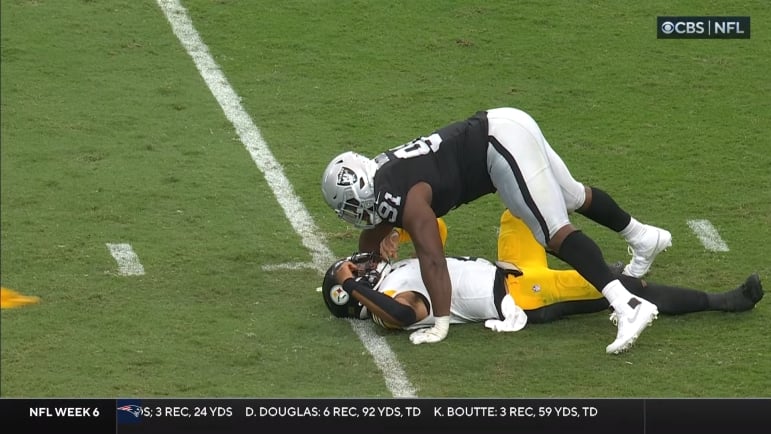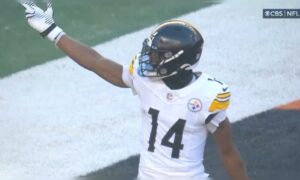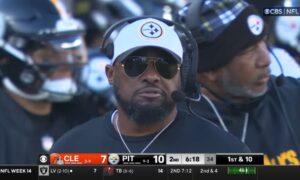The Pittsburgh Steelers defeated the Las Vegas Raiders, 32-13, in their most lopsided win since Mason Rudolph’s 2023 breakout game. But many things broke the Steelers’ way to turn the scoreboard on its head like that, Chris Hoke argues. Specifically, he cites the officiating, slanted against the Raiders, for the misleading final score.
“No way, not so fast”, Hoke said about categorizing the Steelers’ win over the Raiders as a blowout. On the Steelers Extra Point postgame show on KDKA. “There were 21 points out there that were hidden that could have gone either way. You had an interception thrown by Justin Fields after the punchout by T.J. Watt that was overturned by a roughing the passer. Totally questionable call; I don’t think it was a great call”.
You can judge for yourself whether that was a legitimate roughing call. I think you can argue at least that the roughing itself did not cause the interception. The Steelers scored a touchdown four plays after that negated giveaway to take the lead, 12-7.
“Then there was another roughing the passer that led to another score”, Hoke said, which Fields has been drawing so far this year, interestingly. Usually mobile quarterbacks don’t get the benefit of the doubt on roughing, but the Steelers won’t complain. They had 3rd and 18, and Jaylen Warren picked up six on the play. Two plays later, Najee Harris broke free for a 36-yard touchdown, the Steelers going up 22-7.
“Then you had another score that the Raiders had that was called back and I didn’t think it was an illegal man downfield”, Hoke added. You can take a look at that play. And you can also clearly see that a lineman was more than a yard beyond the line of scrimmage.
“It could have been a totally different ballgame if it weren’t for the bad calls”, Hoke says, but whether the calls were bad is a matter of opinion. By the letter of the law, they were all fair flags. The Steelers wouldn’t have been pleased to draw them, but they were infractions. “The referees had their fingerprints all over this football game”.
Technically, yes, the referees greatly influenced the outcome of the game. The Raiders failed to score after a penalty negated that touchdown, T.J. Watt forcing a fumble two plays later. Obviously, the Steelers don’t score on either of those drives with the roughing penalties.
But the influence of the officials isn’t a bad thing if they are doing their jobs and enforcing appropriately. We constantly complain about roughing-the-passer calls, but that’s because the league has a low threshold for throwing flags, so we can’t split hairs. And we know the league is enforcing the ineligible receiver rule and illegal formations heavily. Of course the Steelers benefited from the officiating, but that’s because the officials made appropriate calls against the Raiders.








